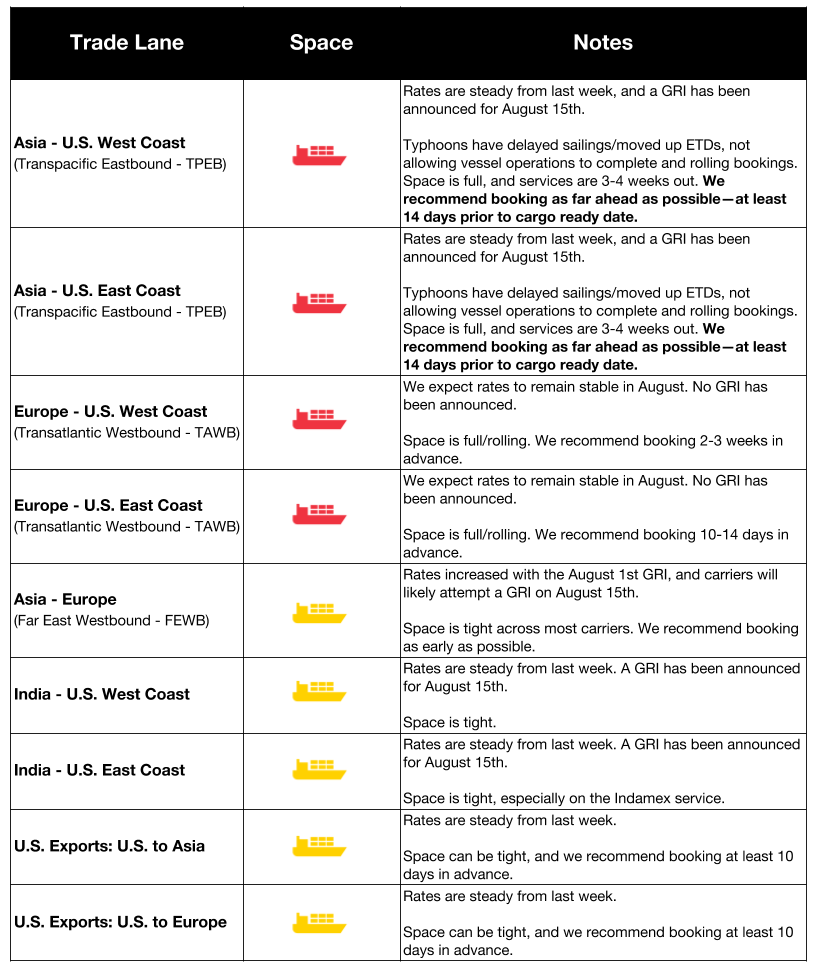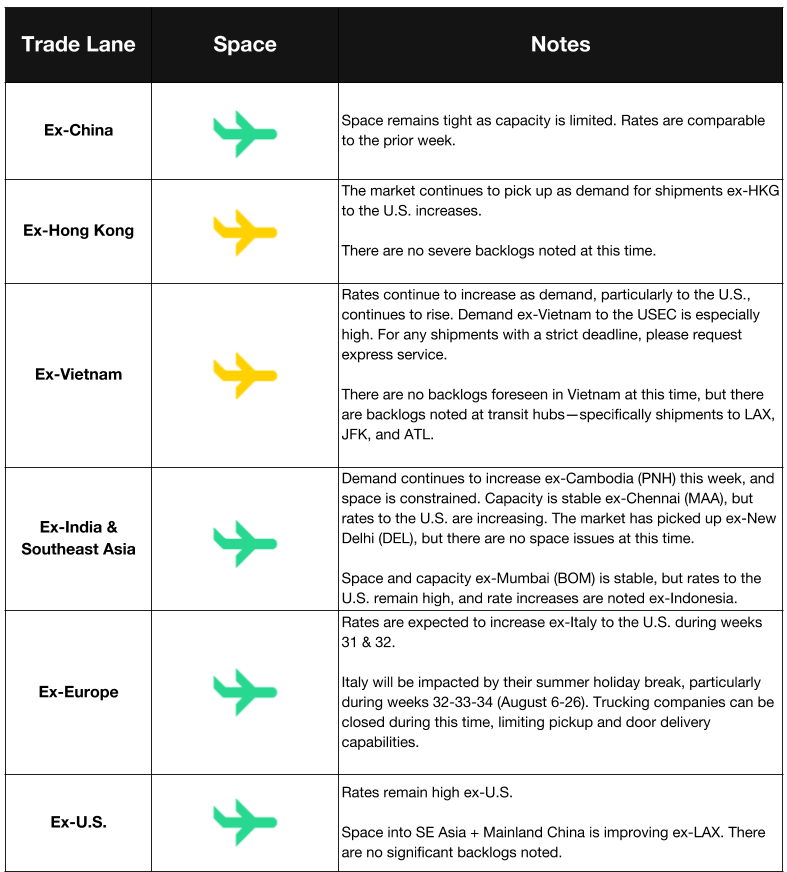Global Logistics Update
Freight Market Update: August 8, 2018
Ocean, trucking, and air freight rates and trends for the week of August 8, 2018.
Freight Market Update: August 8, 2018
Want to receive our weekly Market Update via email? Subscribe here!
Ocean Freight Market Updates

Maersk Expects Lower-Than-Planned Earnings
Rising fuel prices, escalating trade tensions, and soft freight rates are three factors contributing to Maersk’s announcement on Tuesday that its earnings would be lower than expected. The world’s largest cargo carrier plans for core profits of $3.5bn to $4.2bn, compared to last year’s guidance of $4bn to $5bn. Analysts predict lower earnings among top operators.
Mexico’s Shipping Industry Looks to Tech to Mitigate Cargo Theft
Shippers, railroads, and truckers are looking to technology to combat rising cargo theft in Mexico, JOC reports. Advanced trace-and-track technology is used to monitor the movement of cargo and signal attacks, giving shippers notifications to alert authorities.
India’s Monsoon Season is in Effect
Monsoon season is in effect from June through October:
- We highly advise shrink wrapping all FCL/LCL pallets and cartons that may be prone to being affected at the time of origin stuffing
- Expect vessel delays/port closures due to weather constraints
- Indian POL’s that receive the most rainfall are Chennai, Tuticorin, and Kochi
Peak Season Came Early This Year
U.S. import volumes are increasing ahead of the holiday retail season for a number of reasons, including:
- Capacity cuts and service changes
- Tariff deadlines
- Slow Q1 & Q2
Read the full analysis from Flexport’s VP of Ocean Freight here.
**Trans-Pacific Peak Season Sees Higher Rates **
U.S. importers shipping in trans-Pacific should expect higher rates, as peak season has caused very low capacity on most ships. As JOC reports, “Ocean carriers in certain cases are holding the line on weekly minimum quantity commitments (MQC) as they have done in prior periods of tight capacity, meaning that any given shipper will be allocated only one week’s worth of capacity out of its total annual MQC.”
**TPEB Services Are 3-4 Weeks Out **
TPEB services are three to four weeks out, and we recommend booking at least 14 days in advance of the cargo ready date. Carriers are continuing to announce blank sailings and canceling services, which will likely lead to a tightening of the market and an earlier onset of peak season.
Impact of New IMO ECA Regulations
The International Maritime Organization has mandated under new Emission Control Area regulations that by 2020, all merchant vessels must reduce their sulphur emissions to 0.5% from 3.5%.
Whether they upgrade their vessels or their fuel, carriers will need to undertake significant changes to comply with the new regulations, and those changes will come at a cost to shippers. Rates may climb between now and 2020 as a result.
Air Freight Market Updates

Trade Dispute Hasn’t Yet Affected Peak Season Expectations for Air Freight
Air cargo expectations are still high for the “second half and into the end-of-year peak season” as the strong demand seen in the first six months is expected to continue. According to the JOC, volume has been steadily increasing in the east-west trades.
While trade relations may affect how goods move in the near future, there hasn’t yet been any change in consumer behavior.
**ELD Mandate Negatively Impacts Air Cargo **
The electronic logging device (ELD) mandate’s repercussions move far beyond the road, as air cargo providers are citing negative consequences. Higher trucking rates, delays, and even modal switches are some of the negative consequences for air cargo.
Related: The Electronic Logging Device (ELD) Mandate -- What You Need to Know
**Forwarders & Shippers Prepare for Low Air Capacity **
The 2017 capacity constraints for air freight aren’t forgotten in the minds of shippers and forwarders. In response to last year’s shortages and higher-than-usual rates, shippers are looking for guaranteed space throughout the year for their products, and some are looking for their own planes. Forwarders are chartering more flights to guarantee space and reserving planes for select shippers.
The Loadstar reports that demand growth is at 4-5%, and that April, which is usually the beginning of slack season, was stronger than expected.
Related blog post: Investing in Service, Flexport to Charter its Own Aircraft
Trucking Market Updates
**U.S. Truckload Carriers Predict Even Tighter Capacity Ahead **
With no indication that freight demand is slowing down anytime soon, trucking carriers are experiencing rapid revenue growth. As a result, shippers who don’t book in advance may be out of luck when looking for capacity.
**Big Rigs Get an Update Aimed at Efficiency **
Trucks are getting “smarter” as companies upgrade to new technology. From new tires to advanced navigation and communication systems, companies are looking for avenues to improve efficiency and lower the cost to serve.
Heavy-duty trucks are leveraging the internet to pull data from trucks with the goal of improving transit times and reducing the rate and impact of human errors. While the cost of upgrades can seem high, companies report that they’re saving money in the long run.
Updated PierPass OffPeak System to Start in Fourth Quarter
On June 26th, members of the West Coast MTO Agreement (WCMTOA) announced that the program for providing extended gate hours (PierPass 2.0) has a planned start for the fourth quarter of 2018. A Q&A on the revised OffPeak program is available here.


